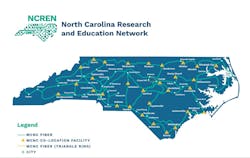MCNC advances quantum role via NC State’s IBM center membership
Key Highlights
- MCNC has joined the IBM Quantum Innovation Center at NC State, gaining access to quantum processors and pulse-level control for research and education.
- The partnership enables free quantum computing resources for North Carolina’s higher education and research communities, fostering innovation and interdisciplinary research.
- MCNC’s extensive network supports K-12, higher education, healthcare, and government institutions, providing critical infrastructure for emerging technologies.
- The organization is actively supporting AI and quantum research through NSF grants, GPU-as-a-Service platforms, and collaborative data exchange initiatives.
- These efforts aim to democratize access to advanced computing resources, especially benefiting smaller and rural institutions in North Carolina.
MCNC has joined the IBM Quantum Innovation Center at NC State University, further solidifying its role in the emerging quantum networking space.
The non-profit will now be able to bring quantum computing resources to the organization’s higher education and research communities at no charge.
The IBM Quantum Innovation Center at NC State has become a hub for quantum computing education, research, development, and implementation – working directly with industry and academic members and IBM to advance quantum computing as well as interdisciplinary applied research, student development, and quantum curricula.
According to IBM, the Quantum Innovation Center is structured as a hub and spoke model of engagement, and members can represent industry, academia or government. Each entity, including NC State, has its own dedicated cloud-based access slot with the goal of exploring practical applications important to business and science.
Also, each member has access to IBM’s quantum processors. Access through the IBM Quantum Innovation Center also allows pulse-level control of qubit operations through the OpenPulse API. Pulse-level control is critical to enhancing the performance of the present generation of noisy, intermediate-scale quantum (NISQ) computers, and this capability is only available through an IBM Quantum Innovation Center.
Tracy Doaks, CEO of MCNC, said this collaboration will be a “game changer” over the next year, providing research and education institutions on MCNC’s network with free access to the IBM Quantum Network to help support application development, training, and education.
“By becoming a member of the IBM Quantum Innovation Center at NC State, we will be able to help advance quantum computing and continue exploring its powerful potential as a viable platform of the future,” Doaks said.
Fulfilling infrastructure needs
As it relates to quantum, MCNC is in a prime position to support the emerging needs of this segment.
The R&E provider’s North Carolina Research and Education Network (NCREN) middle mile network today spans more than 4,500 miles of digital infrastructure in all 100 counties, providing connectivity, networking technologies, cybersecurity and support to colleges, universities, community colleges, K-12 schools, health care institutions, libraries, governments and research institutions.
Since 1980, NCREN has provided a foundation for colleges, universities, and the North Carolina Community College System (NCCCS). NCREN also serves educational and cultural institutions such as museums and aquariums.
“We support all education in North Carolina,” Doaks said. “Our research and education network supports all of the K-12 schools, charter schools, community colleges, and almost all of the public and independent public universities.”
Enabling new research
While providing education facilities is key, research is also key to MCNC’s mission. MCNC has put in place efforts to focus on
Doaks said during her early days on the job at MCNC, she was inspired by a researcher to enhance its research mission.
“When you think about researchers, and the work they do, they need infrastructure,” Doaks said. “We were approached early on, and one of our board members, who happens to be a prominent researcher at NC State University, asked me when the R is coming back into Research and Education networks?”
Doaks took the researcher’s words to heart and set out on a mission to see what kinds of infrastructure and services it could provide. MCNC has three NSF grants, along with Duke University and a few other smaller schools, for a statewide data exchange for its interconnect student data systems study.
To foster a collaborative environment, MCNC takes part in NC Share. NCShare is a partnership between Duke University, Davidson College, North Carolina Central University (NCCU), and, recently, the University of North Carolina -Chapel Hill and North Carolina Agricultural and Technical University. The initiative provides connectivity to all participating campuses.
“This whole environment allows some of these smaller schools, especially in the rural communities that don’t have access to this collaborative infrastructure,” Doaks said. “NC Share allows all of the researchers to go to one place to share data and information, which makes their research more valuable in ways they could not on their own.”
MCNC has two NSF grants dedicated to looking towards how it can support AI and quantum computing and networking research and industry development support.
One of the grants supports GPU-as-a-Service (AI-GaaS). This initiative creates a shared, scalable platform for artificial intelligence (AI) and machine learning (ML) research using virtualized GPUs. Instead of purchasing and maintaining expensive on-premises hardware, researchers can remotely access GPU computing power on demand and pay only for what they use.
This platform has benefits for both large and small educational institutions. Smaller colleges with limited budgets can get access to GPU resources. Likewise, MCNC provides large research universities with the ability to reach even greater computational capacity for intensive AI workloads.
In addition to its collaboration with IBM, MNCN has a pilot that will provide a quantum test bed for researchers. “We recognize how AI intersects with quantum, and we’re helping to change the technology around that,” Doaks said.
For related articles, visit the Business Topic Center.
For more information on high-speed transmission systems and suppliers, visit the Lightwave Buyer’s Guide.
To stay abreast of fiber network deployments, subscribe to Lightwave’s Service Providers and Datacom/Data Center newsletters.
About the Author
Sean Buckley
Sean is responsible for establishing and executing the editorial strategy of Lightwave across its website, email newsletters, events, and other information products.



